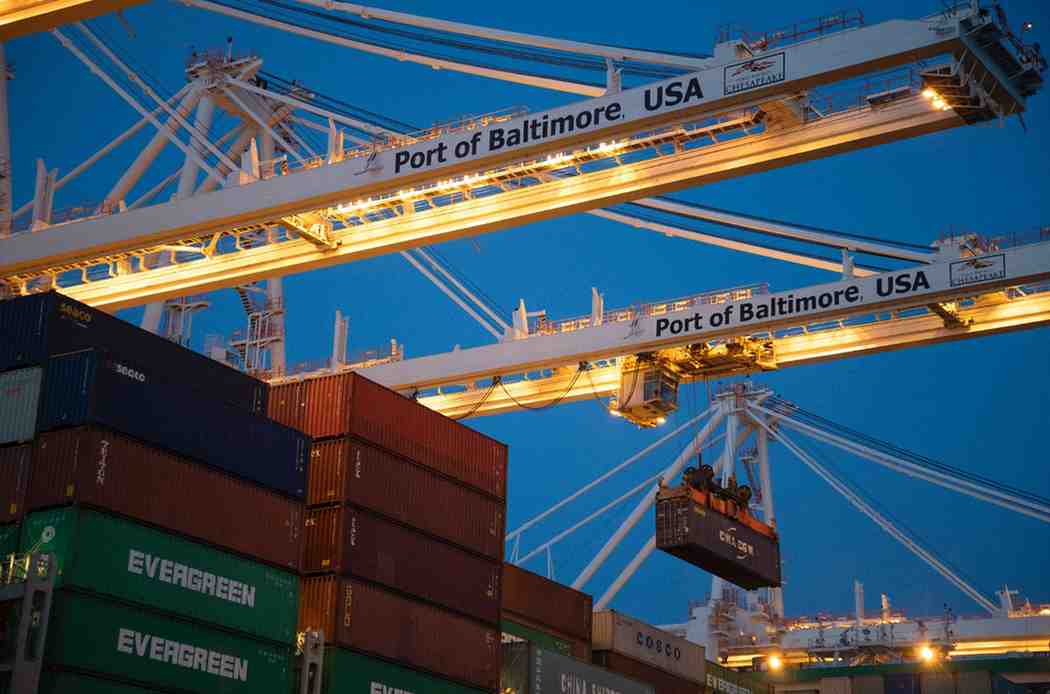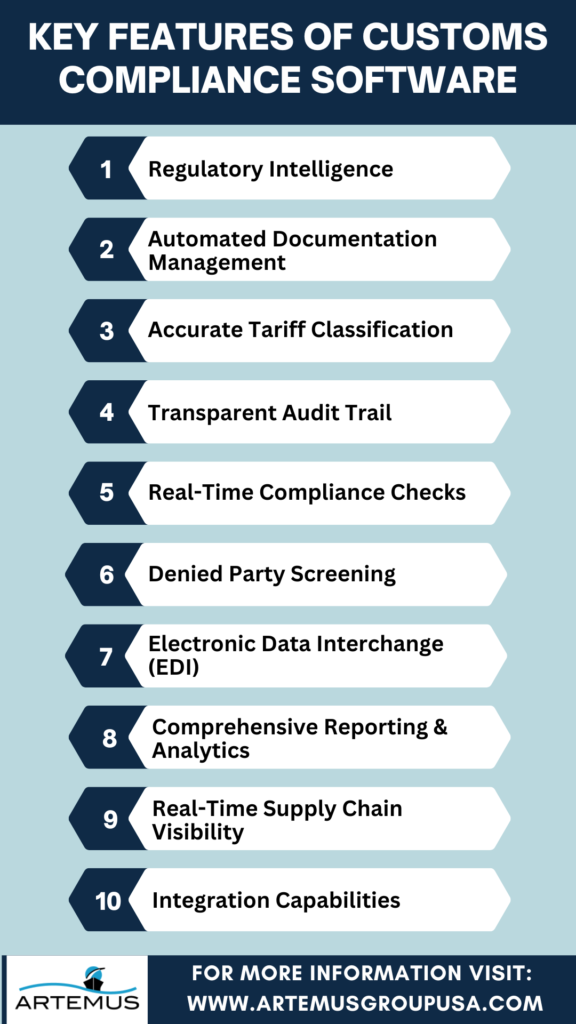
What Is Inbound Logistics & Outbound Logistics? A 2025 Guide
In the dynamic world of supply chain management, understanding the nuances of inbound and outbound logistics is crucial for operational

Welcome to the forefront of modernizing international trade operations with cutting-edge Customs Compliance Software. In an era where the seamless flow of goods across borders is paramount, the role of sophisticated software solutions has become indispensable. Today, we delve into the realm of Customs Compliance Software—a game-changer for customs brokers, importers, exporters, & businesses navigating the complexities of global trade regulations.
At the forefront of this transformative wave is Artemus, offering a comprehensive suite of Customs Compliance Software solutions. From ISF software to AMS software, Emanifest – Canada software to Japan AFR, and the versatile Customs Broker Software, Artemus stands as a beacon of innovation.
Each software component is engineered to not only streamline operations but also ensure adherence to the latest regulations, providing a robust framework for businesses to navigate the intricacies of international trade seamlessly.
Table Of Contents
Customs compliance software is a specialized technological solution designed to streamline and automate complex processes ensuring adherence to customs regulations and international trade laws.
This software is crucial in facilitating efficient cross-border trade by helping businesses manage and track various compliance requirements, such as documentation, tariffs, duties, and import/export regulations.
By automating these tasks, customs compliance software not only reduces the risk of errors and delays but also enhances overall supply chain efficiency. It enables businesses to stay up-to-date with the ever-changing customs landscape, ensuring smooth and lawful international trade operations.
Related: Customs Broker Exam Registration: In-Person & Remote CBLE
In the dynamic landscape of international trade, customs compliance software emerges as an indispensable tool, offering businesses a streamlined and automated approach to navigating complex regulatory frameworks. Here are five compelling reasons why businesses should leverage this technology:
Customs compliance software keeps businesses agile by automatically adapting to and ensuring adherence to ever-changing customs regulations and international trade laws, minimizing the risk of non-compliance and associated penalties.
Automation provided by the software enhances operational efficiency, reducing manual errors and expediting processes such as documentation, tariff calculations, and compliance checks, thereby facilitating smoother cross-border transactions.
The software acts as a proactive risk management tool, identifying and addressing potential compliance violations, tariff discrepancies, and other risks in real time, enabling businesses to mitigate issues and maintain a resilient supply chain preemptively.
By automating routine tasks and providing insights into cost-effective trade routes, customs compliance software contributes to significant cost savings, preventing unnecessary expenses related to compliance errors, delays, and inefficient supply chain practices.
Offering enhanced visibility into the entire supply chain, the software enables businesses to track the movement of goods in real time, fostering transparency, informed decision-making, and improved inventory management for a more responsive and competitive supply chain.
Related: How To Find A Customs Broker? 7 Important Factors To Know

Navigating the complexities of international trade requires precision and compliance. Here are ten key features that make customs compliance software indispensable for businesses engaged in cross-border transactions:
1. Regulatory Intelligence: Customs compliance software provides up-to-date information on regulatory changes, empowering businesses to stay compliant with the latest international trade laws and regulations.
2. Automated Documentation Management: The software streamlines the creation and management of trade documents, reducing manual effort and ensuring accuracy in paperwork such as invoices and certificates of origin.
3. Accurate Tariff Classification: With automated tariff classification, businesses can precisely categorize products, preventing errors in duty and tax calculations and ensuring compliance with customs declarations
4. Transparent Audit Trail: Robust audit trail features create a transparent record of all transactions and compliance activities, facilitating easy audits and demonstrating adherence to regulations
5. Real-Time Compliance Checks: Customs compliance software conducts real-time compliance checks to verify that shipments align with regulatory requirements, mitigating the risk of fines, penalties, and delays.
6. Denied Party Screening: Integrated denied party screening functionality allows businesses to cross-reference trading partners against government watchlists, preventing engagement in prohibited transactions.
7. Electronic Data Interchange (EDI): EDI capabilities enable seamless communication and data exchange between trading partners and government agencies, promoting efficiency and reducing communication errors.
8. Comprehensive Reporting & Analytics: The software offers reporting and analytics features for valuable insights into trade activities, empowering businesses to optimize processes and make informed, data-driven decisions.
9. Real-Time Supply Chain Visibility: Providing real-time visibility into the supply chain, the software allows businesses to track the movement of goods, monitor key milestones, and enhance overall transparency.
10. Integration Capabilities: Customs compliance software seamlessly integrates with other enterprise systems, such as ERP and logistics platforms, ensuring a cohesive approach to international trade management with improved efficiency through streamlined data flow.
Related: Customs Broker VS Freight Forwarder: 5 Key Differences
Selecting the right customs compliance software is pivotal for seamless international trade operations. Consider these five essential factors to assist you in making informed decisions:
Related: How To Become A Customs Broker? A Step-By-Step Journey
In the dynamic realm of international trade, efficiency, accuracy, and compliance are paramount. Artemus, a leading provider of Customs Compliance Software, offers a comprehensive suite designed to streamline operations and ensure adherence to the latest regulations. With a commitment to revolutionizing customs brokerage, Artemus stands as a beacon of innovation in the ever-evolving landscape of global trade facilitation.
Artemus’ ISF (Importer Security Filing) software is a vital tool for customs brokers, ensuring the timely and accurate submission of essential security information to U.S. Customs and Border Protection. By facilitating early communication of shipment details, the ISF software contributes to enhanced supply chain security and compliance with regulatory requirements.
Artemus’ AMS (Automated Manifest System) software simplifies and expedites the submission of cargo manifests to customs authorities. This efficient tool is designed to enhance accuracy and speed in the processing of cargo information, facilitating the smooth flow of goods through the customs clearance process.
Artemus’ Emanifest – Canada software is a cornerstone for customs compliance in the Canadian trade landscape. It enables seamless communication of shipment details to the Canada Border Services Agency (CBSA), streamlining cross-border trade operations and ensuring compliance with Canadian regulatory requirements.
Artemus’ Japan AFR (Advanced Filing Rules) software is tailored to meet the unique customs regulations in Japan. By enabling the timely submission of shipment information to Japanese customs authorities, it ensures compliance and expedites the customs clearance process, contributing to efficient trade operations in the Japanese market.
Artemus’ Customs Broker Software is a versatile and customizable solution designed to meet the specific needs of customs brokers. This comprehensive tool encompasses a range of features, including real-time tracking, alerts, invoicing capabilities, and proactive compliance management. It empowers customs brokers to streamline their workflow, reduce errors, and navigate the complexities of international trade with ease.
Related: Can A Customs Broker Be The Importer Of Record Legally?
Customs compliance refers to adhering to the rules and regulations set by customs authorities during international trade to ensure the lawful and seamless movement of goods across borders.
Trade compliance software is a technological solution that automates and manages the adherence to regulatory requirements and international trade laws to facilitate efficient and compliant cross-border transactions.
Organizations across industries, including finance, healthcare, and manufacturing, use compliance software to ensure adherence to regulatory requirements and internal policies.

In summary, customs compliance software is essential for businesses navigating international trade regulations. This technology automates complex processes, mitigating the risks of non-compliance and facilitating accurate documentation. Its adaptability to evolving regulatory frameworks makes it a crucial asset, ensuring a more efficient and legally compliant cross-border trade environment for companies across diverse sectors.
Related: Customs Broker Exam (CBLE): A Comprehensive 2024 Overview

In the dynamic world of supply chain management, understanding the nuances of inbound and outbound logistics is crucial for operational

In today’s interconnected world, businesses rely heavily on global trade to expand their markets, access new resources, and drive growth.

Importing goods for resale in the USA presents a lucrative business opportunity, but navigating the complexities of U.S. customs regulations,
Get In Touch
Artemus’ Software Solutions for ISF, AMS, Japan AFR, eManifest Canada, & Panama B2B filings.